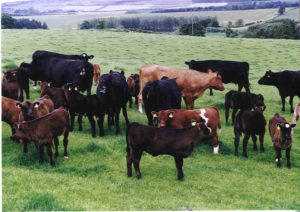Thoughts on Weaning
18 August 2016 More producers are finding that leaving the calves in the field they have been in all summer and taking away their mothers does help reduce the weaning check – but still needs strong fences! Refinements on this approach could be –
More producers are finding that leaving the calves in the field they have been in all summer and taking away their mothers does help reduce the weaning check – but still needs strong fences! Refinements on this approach could be –
- To simply swap the cows over between 2 groups, leaving the calves in their original field. This would give both the calves and the cows “social” company even if they aren’t mother and calf.
- An alternative approach would be to stagger swapping over cows, giving the calves to be weaned later on, time to adjust to the new weaned cows in the group.
- Cows for early weaning could be the leanest cows, allowing them more time to regain condition ready for calving or the early calved cows who have been milking the longest.
- To minimise the check even further, at housing the leanest cows could be kept in with the weaned calves for the first few weeks and would benefit from the much higher level of nutrition the weaned calves would be fed.
I am sure many of you will find the above well over the top but remember –
- Weaning is the second most stressful time of an animal’s life, after birth.
- Stress compromises the animal’s immune system making it much more susceptible to disease.
- Unfortunately weaning for spring calving herds coincides with the start of the pneumonia season.
- The severe check after a normal weaning when everything changes at the same time (calves are housed, the mothers taken away, their feed changed and often they are handled wormed, etc all at the same time) can easily amount to a 10 – 20 kg loss in performance.
- Most importantly remember how enjoyable it is dealing with a pneumonia outbreak, paying for disposal of the dead, for the vets time and penicillin etc, while watching the vast majority of animals in the group going through a major check for perhaps a month or even more!
Basil Lowman, basil.lowman@sac.co.uk.
Sign up to the FAS newsletter
Receive updates on news, events and publications from Scotland’s Farm Advisory Service
